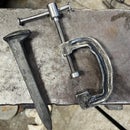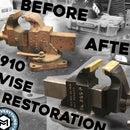Introduction: How To: Miter Saw Shadow Line
Today iI’m going to be adding this inexpensive LED light to the saw hood on my miter saw. This led light will shine directly down over the blade and cast a shadow onto the workpiece.
Check out the video tutorial here:
Dive into this intractable for a detailed write up of the process.
This type of light system is becoming a new standard on miter saws, but this Bosch GCM12SD saw that I am using doesn’t have that option. Companies like Dewalt, ridgid, and Milwaukee have put this light system on their newer models. The real key to this LED light working properly is that it is centered over the blade, this is easy to do, and easy to verify before you attach anything to the saw. The other part of this that is crucial is that your particular saw guard has to have enough room to clear the LED light as it comes up over the saw hood.
LED Light I used: https://www.amazon.com/gp/product/B005UF8P52/ref=oh_aui_search_detailpage?ie=UTF8&psc=1
Step 1: Disassemble the LED
The led light I'm using is a very simple “sewing light” from amazon (link: ) . I like this light because it has a little magnetic enclosure that houses the control board and a switch, it also has a very slim plug and not one of those big black box plugs. To take it apart i gave it a little tap with the back of a screwdriver and it popped open. Once its apart I pulled the flexible gooseneck from the led out of the housing so I could remove the components from the enclosure completely.
Step 2: Remove the Blade Guard
On this Bosch saw the blade guard is very easy to remove, two screws near the arbor, and one large screw near the pivot point. Once its removed I also remove a small plastic piece near the end of the saw hood. This piece will be modified and re used later to hold the new LED light in place.
Step 3: Test Fitting the LED
Whats nice about this project is that its really easy to see that its going to work right away. Once the blade guard and plastic piece are removed I take a bit of gaffers tape and tape the LED light to the top of the saw hood. I then move the blade up and down a few time over a sample piece of wood and make sure I'm getting an accurate shadow line.
Step 4: Extending the Wires
This particular saw uses a 12” blade, so the top of the saw hood is very large. Because of that I need to extend the wires that go from the LED light to the control board/enclosure. If you do not extend the wires the blade guard will hit the enclosure when the saw head is brought down to make a cut. To do this I will use 22 gauge speaker wire and some solder. To begin, I desolder the led light from the control board by heating up the two points of contact. I then strip back the wires and solder a 7” extension to both leads. There is a - an a + side of the control board and you need to make a note as to which color wire out of the LED goes to which terminal.
Step 5: Securing the Connections
Once the two wires are soldered I will use heat shrink tape to insulate the bare wire and enclose the two separate wires giving it a nice clean look.
Step 6: Re Attaching to the Control Board
Now that I have a securely extended LED power wire I will wonder it back to the control board at the original + and - terminals that i removed it from. Twist the wires tight and pass them back through the holes. Add a little bit of solder and test to make sure the light still functions. It goes without saying that the light should have been UNPLUGGED during the last few steps and be extra careful when plugging it back in while the enclosure is open.
YOU CAN AND WILL GET SHOCKED AND POTENTIALLY SHORT OUT THE CONTROL BOARD IF YOU TOUCH BARE WIRES WHILE IT IS PLUGGED IN. BE CAREFUL.
Step 7: Reassemble and Test Fit Again
Now that everything wired back up put all the components back in the enclosure and move back over to the saw. Using some tape I put the LED light back on the saw hood and just double check that everything is working properly.
Step 8: Mount the LED Light (modify the Original Plastic Piece)
Here is where that little black plastic piece comes back into play. The way its shaped is nearly perfect to house the new LED light. I will draw a general approximation of the shape and use a Dremel with a cut off wheel to remove material from the plastic piece. It takes a few attempts at fitting and grinding to get it just right.
Once it all fits together I reattached the plastic piece with the LED inside of it using 2 of the 4 screws I had removed. You will see it sits a little proud of the front once its seemed but its very sturdy even with just 2 screws. (keep the other two screws just in case)
Step 9: Attach the LED Cable
Using a few dabs of hot glue I attach the new LED cable to the top of the blade hood. I use hot glue because it will not harm the paint on the saw, but is very sturdy. It will allow me to take this light off easily if I want, and will be secure.
Step 10: Re-attach the Blade Guard
Now you can put your blade guard back on, blade guards are important so make sure this is done properly! Keep yourself safe!
Step 11: Mount the Control Box/switch, Power It Up
This particular light has a magnetic base which is great for this application. The Bosch saw has a steel support arm on the blade guard so I just magnet the control box to the back side of the steel arm.
This keeps it out of the way when cutting material but its easily within arms reach when I want to turn it on or off. To power the LED light I purchased a 3 way splitter from my local hardware store so I only need 1 plug on an extension cord to power the whole system.
Step 12: Test It Out! Become a Miter Saw Master!
You did it, your saw has been upgraded in a way that will forever change woodworking! Seriously though, once you use a shadow line on a saw you'll wonder how you ever cut wood without it. The level of accuracy you can achieve with a shadow line like this is unparalleled, even with lasers. The beauty of this install is that its basically self calibrating. If you have a thin kerf saw blade, the shadow will be thin, a thick kerf saw blade, the shadow will be thick. I hope this intractable will encourage people to try this modification. I have done this to a few saws now and every time I use a saw that DOESN’T have a shadow line I feel like a part of me is missing. If you have any questions, please leave them in the comments and I will be glad to answer. Don't forget to check out my youtube channel for more stuff like this and interesting projects!.




